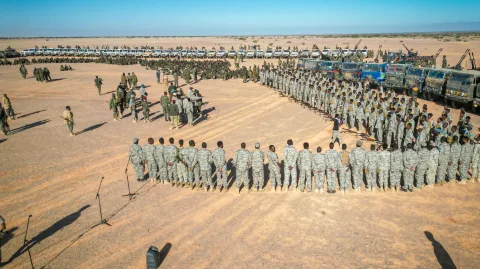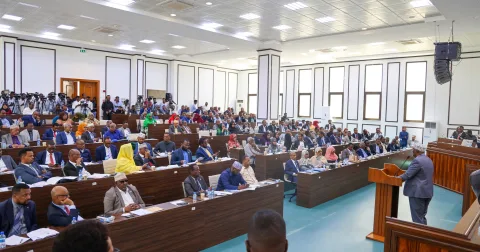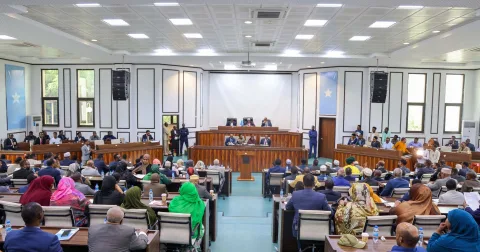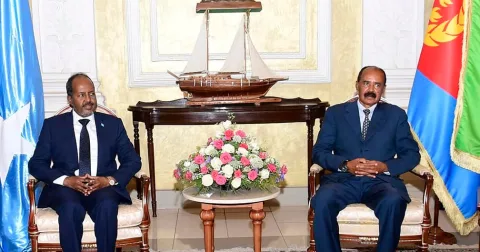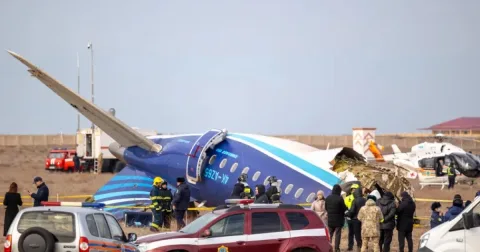In the intricate tapestry of global geopolitics, Somalia stands out as a beacon of both progress and ongoing challenges.
by Dr. Peter Middlebrook
With Amba Tadaa and Eleni Armelinda Kubolli
In the intricate tapestry of global geopolitics, Somalia stands out as a beacon of both progress and ongoing challenges. This East African nation, often overshadowed by the narratives of conflict and instability, has been quietly scripting a story of resilience and state-building. However, as the international community contemplates a recalibration of its involvement in Somalia, it’s critical to reflect on the journey thus far and the path that lies ahead. The lessons learned from other global engagements, notably in Afghanistan and Iraq, offer a stark reminder however: premature disengagement in external security can unravel years of progress.
A Nation Rebuilding: Strides in Governance and Security
Somalia’s strides in governance cannot be overstated. The establishment of revised national security architecture, models for fiscal federalism, and steps towards one-person-one-vote elections are monumental for a country rebounding from years of turmoil. Government leadership continues to display a commitment to a Somalia that is self-reliant and democratically robust.
In terms of the security transition, Operation Black Lion, a Somali-led initiative, is a testament to the nation’s growing capacity to tackle security threats, particularly the formidable presence of al-Shabaab. This operation, crucial in degrading the influence of the terrorist group, signifies a turning point where Somalia is taking the helm in securing its future.
While such gains are undeniable, and leadership aside, building the core functions of a sustainable state (that can maintain the legal monopoly on legitimacy, force and capital) takes decades; not least because revenue is critical pre-condition for a viable state. Currently however, and despite gains, domestic revenue remains impossibly low. If it not for existing external support, the current state would rapidly fall and opposition would likely occupy the streets of Mogadishu in days. Cash is king in the world of security the legal monopoly on force.
The Triple Transition: A Delicate Balancing Act
The upcoming phase in Somalia’s journey is marked by a ‘triple transition’ – political, security, and socio-economic. This phase is pivotal and delicate. Each transition must be carefully sequenced to ensure the nation’s stability. The drawdown of the African Union Transition Mission in Somalia (ATMIS) and the potential reduction of the United Nations Support Office in Somalia (UNSOS) are significant shifts in the institutional landscape.
Simultaneously, the socio-economic transition, exacerbated by climate crises and humanitarian needs, remains a colossal challenge. The country is grappling with severe droughts and flooding, impacting traditional pastoral livelihoods and escalating food insecurity.
The Global Community’s Role: A Balanced Exit Strategy
The global community, having invested billions in Somalia, must now focus on a withdrawal strategy that is sensitive to Somalia’s intrinsic needs and timelines. The lessons from Afghanistan and Iraq are clear – a hasty retreat based on externally imposed metrics can lead to a catastrophic collapse of local systems. Given political and security challenges in neighboring Ethiopia and Sudan, if badly managed, contagion would require monumental external support at a time when external resource flows to Ukraine are coming undone and the emergence of a New Middle East risks various stability challenges.
Somalia’s exit strategy must therefore be predicated on the strengthening of core government capabilities, a gradual and measured transfer of responsibilities, and support for homegrown solutions that low cost and durable. As lessons from Afghanistan still ring out, it is clear that hundreds of billions of dollars in external assistance cannot substitute for a homegrown social-contract and social cohesion. Moreover, given the resurgence of Russian interests in Africa following three decades of contraction, making sure that Somalia is not forced into ‘swing state’ territory will be critical to longer term stability.
Evidence suggests that any durable solution in Somalia, as in any post-conflict society, will take time to mature. The international community’s role must therefore evolve from direct involvement and delivery, to capacity substitution, to one of deep support and partnership, enabling Somali institutions to lead their own development trajectory. Given that at no point has civil administration ever fully governed a formal economy, and with power and stability historically brokered through non-state institutions, consensus on the vision for the country and state must remain essentially consensual.
The Threat of Al-Shabaab: A Cautionary Tale
The resurgence of Al-Shabaab remains a persistent threat. This reality necessitates a sustained focus on building Somalia’s counter-terrorism capabilities. An abrupt reduction in international support could create a vacuum, potentially allowing Al-Shabaab to regain lost ground. The haunting possibility of Al-Shabaab marching into Mogadishu, reversing decades of international commitment, serves as a grim warning.
Looking Ahead: A Future Built on Somali Resilience
As Somalia navigates this critical juncture, the promise of a peaceful and prosperous future lies within its grasp. However, this promise can only be fulfilled through a balanced approach that recognizes the complexity of the nation’s challenges and the depth of its potential. With 3,300 kilometers of coastline, and significant gas and oil deposits that can generate significant revenue offtakes, any transition from an externally financed future to one that is domestically durable, will still take a decade or more.
The consolidation of progress in Somalia requires patience, understanding, and a commitment to supporting Somali-led initiatives. The international community’s role is to ensure that the groundwork laid through years of engagement is not undone but rather built upon, respecting Somalia’s sovereignty and agency. The Gulf States will likely be key to long term strategic financing – could provide US$ 1 billion in transitional support – in their own interest.
In conclusion, as Somalia stands at this crossroads, the choices made now will echo through its future. It’s an opportunity to show that with careful planning, respectful partnership, and a commitment to long-term development, nations like Somalia can emerge from the shadows of conflict into the light of sustainable peace and prosperity. Moreover, the critical role of regional strategic partners including the members of the Gulf Cooperation Council (GCC) and Turkey cannot be overly stressed, not least because stemming the future flow of refugees into the Gulf as a result of climate change requires a proactive and forward foreign policy.
If the sequence of the triple-transition is hurried, and the handover from external to domestic sources of resilience is poorly calibrated, Somalia risks becoming another state building failure. Such an outcome would further upend the Horn of Africa. In securing Somalia’s state-building transition in the decades ahead, the notion of alchemy serves as a metaphorical elixir, symbolizing the necessity of deepening long term strategic partnerships in order that golden opportunities turn into the glue that binds the whole-of-society together. Steady as she goes and all hands-on board will be that glue.

Peter J. Middlebrook is the CEO of Geopolicity Inc, and a former World Bank, EU and UK government economist. Amba Tadaa is Director of Projects at Geopolicity Inc., and Eleni Kubolli an intern at Geopolicity Inc. on public policy.
